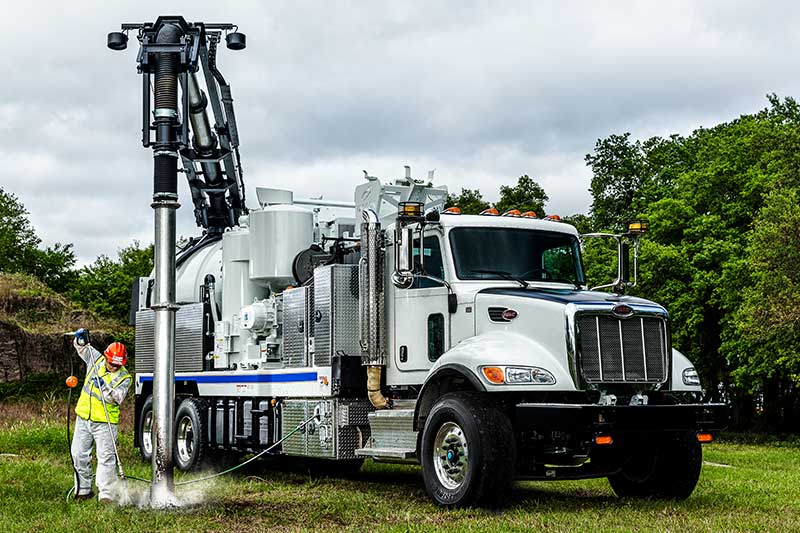 Hydro Wet Vacuum Excavation
Hydro Wet Vacuum Excavation

What is Hydro vacuum excavation? Hydo-Vac, also known as wet vacuum or hydro-trenching, is a non-destructive process that uses pressurized water and a vacuum system to excavate and remove soil with a the best probability of zero damage or injury.
This non destructive excavation method provides a safer, more precise alternative to traditional mechanical (backhoe/excavator) digging methods. It is particularly useful around sensitive or direct buried underground utilities and infrastructure.
What's the process of Wet-Vacuum Excavation?
Pressurized Water: A high-pressure water jet is used to loosen the soil, dirt, or any other material covering the desired excavation area.
Vacuum Suction: As the soil is loosened, a powerful vacuum system sucks up the slurry (water and soil mixture) into a debris tank.
Debris Tank: This tank holds the excavated material until it can be disposed of properly or used back in the hole for refilling after the work is completed.
The Main Benefits and Advantages of Non Destructive Digging.
Safety: Reduces the risk of damaging underground utilities such as gas lines, water pipes, and fiber optic cables, which can be costly and dangerous.
Precision: Allows for more accurate and controlled excavation, enabling operators to dig around delicate structures without causing damage.
Efficiency: Can be faster than traditional excavation methods, as it requires less backfill, less labor, and typically results in shorter project times.
Environmental Impact: Minimizes disturbance to the surrounding site, preserving the existing landscape and reducing the need for restoration work.
Most Popular Applications for Wet-Vac
Utility Locating: Exposing and repairing underground utilities with minimal risk of damage.
Debris Removal: Cleaning out and maintaining sewer lines, catch basins, and storm drains.
Slot Trenching: Digging narrow trenches for installing pipes, cables, or other underground services.
Piling Hole Excavation: Creating holes for pilings and posts with precision, avoiding surrounding utilities.
Cold Weather Digging: Water tank heaters can be installed for effective Hydro excavation on frozen ground, where traditional digging methods struggle.
However, given its benefits, especially in terms of safety and precision, it has become a preferred excavation method in many construction, utility, and infrastructure projects.
Hydo-Vac Limitations and Disadvantages
Despite its many advantages, hydro vacuum excavation is not without its challenges, such as managing the disposal of the slurry and ensuring the availability of sufficient water for the excavation process.
While hydro vacuum excavation offers several advantages over traditional excavation methods, there are also some disadvantages and limitations to consider mentioned below.
Cost: The initial investment and operational costs can be higher than those of traditional excavation methods. The specialized equipment required for hydro excavation, including the vacuum trucks, is expensive. Additionally, operating costs, including fuel and water usage, can add up, especially on large projects.
Water Supply and Disposal: Hydro excavation requires a significant amount of water, which can be a limitation in areas with water use restrictions or limited access to water sources. Moreover, the disposal of the slurry (mixture of water and excavated material) must be managed properly, which can involve additional costs and logistical challenges, especially in environmentally sensitive areas.
Environmental Impact: Although hydro excavation is considered less invasive than traditional methods, it still has environmental impacts. The process can lead to the disruption of soil structures and, if not managed properly, can result in water pollution due to the runoff of slurry. Proper measures must be taken to prevent contamination of local waterways.
Weather Conditions: In extremely cold climates, the water used in hydro excavation can freeze, making the process less efficient or even impossible without additional equipment to heat the water. Conversely, in very hot climates, the efficiency of the vacuum system can be affected by high temperatures.
Limited to Certain Soils: Hydro excavation is most effective in loose, soft soils. In areas with hard, compacted soils or a lot of rock, the process can be significantly slower and less effective, potentially requiring pre-softening of the ground or the use of more powerful and therefore more expensive equipment.
Training and Expertise: Operating hydro excavation equipment requires specific training and expertise. The need for skilled operators can be a limitation, especially in regions where such expertise is scarce or in high demand.
Noise and Traffic: The operation of hydro excavation equipment, particularly the vacuum trucks, can be noisy, which may be disruptive in residential areas or where noise ordinances are in place. Additionally, the size of the equipment can contribute to traffic congestion, especially in urban or confined areas.
The Key Takeaway of Hydro-Vac Excavation
Despite the mentioned disadvantages, the benefits of hydro vacuum excavation such as reduced risk of damaging underground utilities, risk of personal injuries of utility strikes, and overall efficiency and safety—is a proven technology and often outweighs the negatives, making it a preferred choice for many excavation projects.
